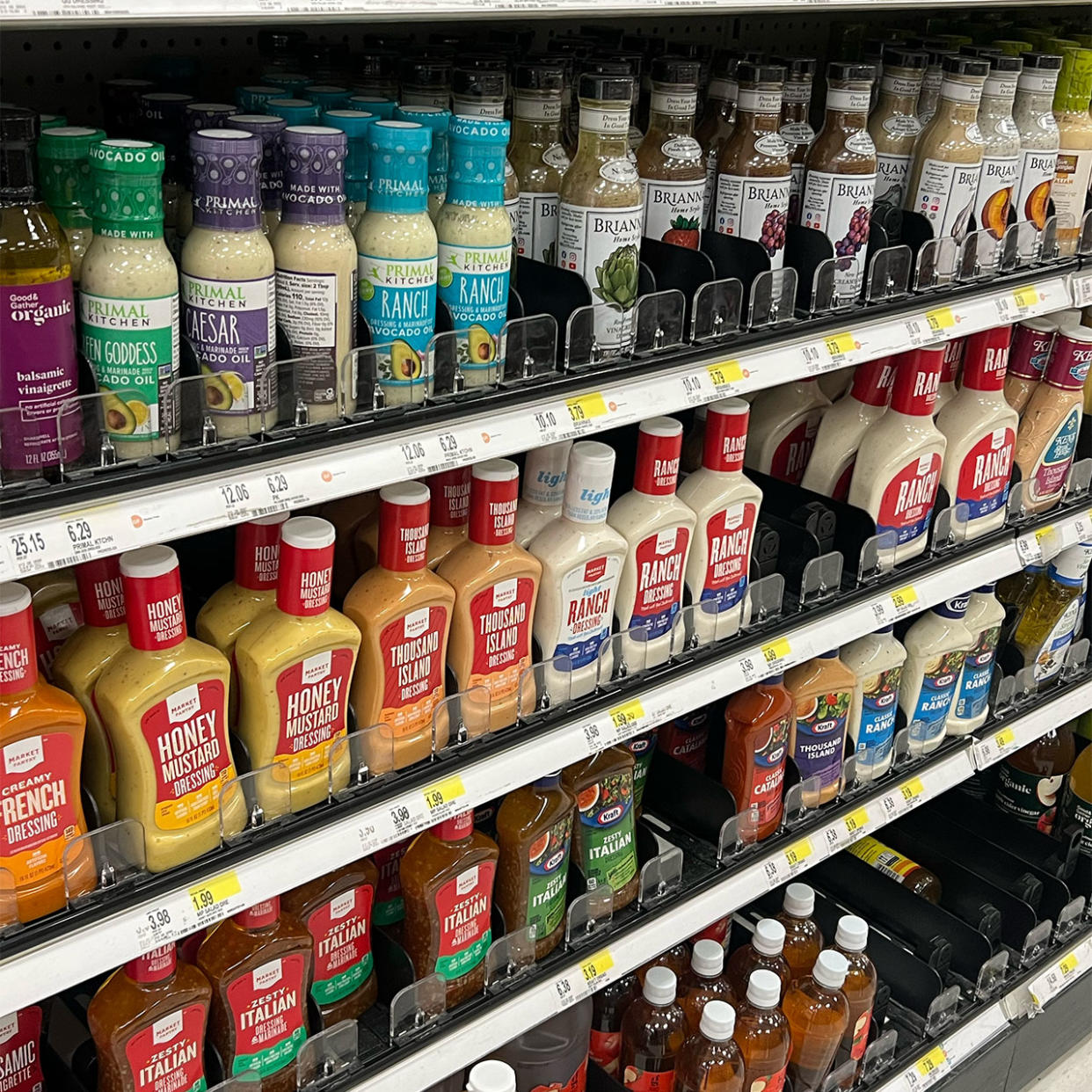6 Sugary, Inflammatory Condiments Dietitians Say To Avoid At All Costs For A Flatter Stomach By May: High-Fat Mayonnaise & More

In the pursuit of a flatter stomach and improved health, the impact of dietary choices, including often-overlooked condiments, cannot be overstated. Sugary and inflammatory condiments can silently contribute to abdominal bloating and inflammation. But, understanding this correlation offers a pathway to achieving a slimmer physique just in time for summer! By eliminating or minimizing these additives from your diet, you can support weight loss goals, reduce bloating, improve digestion, and decrease overall inflammation.
We spoke with Trista Best, MPH, RD, LD; Lisa Richards, registered nutritionist; Jesse Feder, RDN, CPT; and registered dietitian Catherine Gervacio, to learn about six sugary condiments you should minimize for reduced inflammation and a flatter belly. They revealed that ketchup with added sugar, high-fat mayo, creamy ranch dressing, sugary barbeque sauce, high calorie honey mustard, and nacho cheese sauce are the ones to steer clear of.

1. Ketchup With Added Sugar
Despite its seemingly innocuous presence, the excess sugar in ketchup can disrupt blood sugar levels and promote fat storage, particularly around the abdominal area. By cutting out ketchup with added sugar from one's diet, you can significantly reduce the daily sugar intake and mitigate the inflammatory response in your body.
“Most brands of ketchup provide 4 grams of added sugar in just one tablespoon of their product,” Best says. “Knowing that multiple tablespoons of this condiment are used at a typical meal makes this number all the more alarming.”
It's not just inflammation and visceral fat that gets impacted negatively, your gut also experiences the downsides. Best adds, “Gut health can begin to take a toll as a diet high in sugar promotes gut dysbiosis and imbalance of gut bacteria."

2. High-Fat Mayonnaise
High-fat mayonnaise contains a significant amount of saturated fats and calories, which can contribute to weight gain and inflammation in the body. Saturated fats are known to increase levels of LDL cholesterol and some commercial mayonnaise products may contain added sugars and unhealthy additives, further exacerbating inflammation and bloating.
According to Richards, the traditional egg-based form of this condiment should not be perceived as healthy. Richards highlights that even in healthier varieties, the saturated fat content and emulsifiers utilized can potentially harm various organs, particularly the liver.
"As the liver works to filter the excess fat and toxins we ingest, it can become weighed down and under stress by high-fat condiments like mayonnaise," she adds. Instead of mayonnaise, Richards notes that "it is best to go without this condiment or choose a healthier alternative, like whole fresh avocados." This option is more easily processed by the body and the "fat found in them will be more readily digested and used as fuel."

3. Creamy Ranch Dressing
Creamy ranch dressing, while tempting, is loaded with unhealthy fats, additives, and preservatives that can wreak havoc on our bodies. All those saturated fats and extra calories can really pile up, especially around our midsections, making it harder to lose weight by summer.
"One serving of ranch dressing will provide you with around 150 calories and 15 grams of fat," Feder says. "This can really hinder your weight loss journey if you like to have ranch dressing often." He says that the "best thing you can do" is to choose a lite or fat-free option if you want to have ranch while losing weight when the warmer weather hits. Discover more salad dressings to stay away from here!

4. Sugary Barbeque Sauce
Let's talk about that sugary barbeque sauce which we love to slather on our grilled meats. While it adds a tasty kick to our dishes, it's not exactly doing our bodies any favors. Sugary barbeque sauce is loaded with, well, sugar! And all that added sweetness can lead to inflammation in our bodies, which isn't great for our health or our waistlines. Plus, the excess sugar can mess with our blood sugar levels and contribute to weight gain, particularly around the midsection.
"One serving of BBQ sauce only has around 70 calories and no fat,” Feder says, but, many people "don't realize" that it also carries around 16 grams of sugar in one serving. "This added sugar can really hinder your weight loss and metabolism," he notes. "The best thing to do is look for sugar-free or reduced sugar barbeque sauce," he recommends.

5. High-Calorie Honey Mustard
This condiment is loaded with calories, especially from added sugars and unhealthy fats. These ingredients can spike inflammation in our bodies and contribute to bloating, making it harder to achieve that toned midsection we're aiming for. By cutting out this inflammatory condiment, you're not only reducing unnecessary calorie intake but also supporting a healthier digestive system, ultimately leading to a flatter stomach.
"Just one serving of normal honey mustard can pack on anywhere from 100-180 calories," he reveals. "In addition to the high caloric content, it usually has 10-15g of fat which is a large amount for just one serving of a condiment," Feder shares.
A healthier options is to look for "reduced fat or fat-free honey mustard if you are trying to lose weight."

6. Nacho Cheese Sauce
Just like other creamy and high-fat condiments, this cheesy concoction might taste delicious, but it's often packed with unhealthy ingredients like artificial flavors, colors, preservatives, and saturated fats. These components can trigger inflammation in our bodies, leading to bloating and discomfort, especially around the stomach area.
"Processed cheese sauce often contains a high amount of additives, sodium, and saturated fats. These substances cause inflammation and potential health risks," Gervacio warns. She also advises against the high sodium content, in particular, which can lead to a number of issues. "Sodium may cause water retention especially when taken in excess. This, in turn, may result in swelling and may contribute to inflammatory responses."

